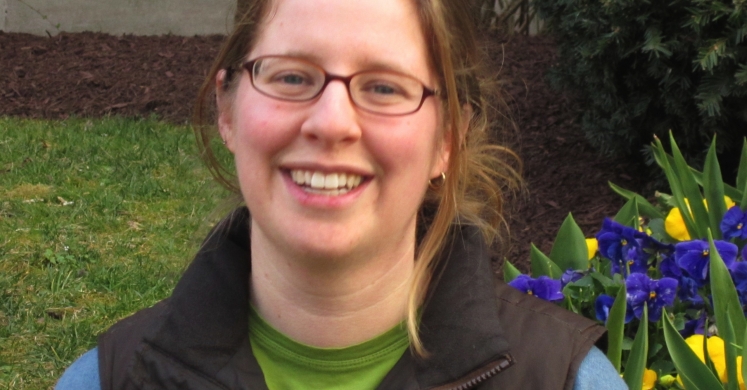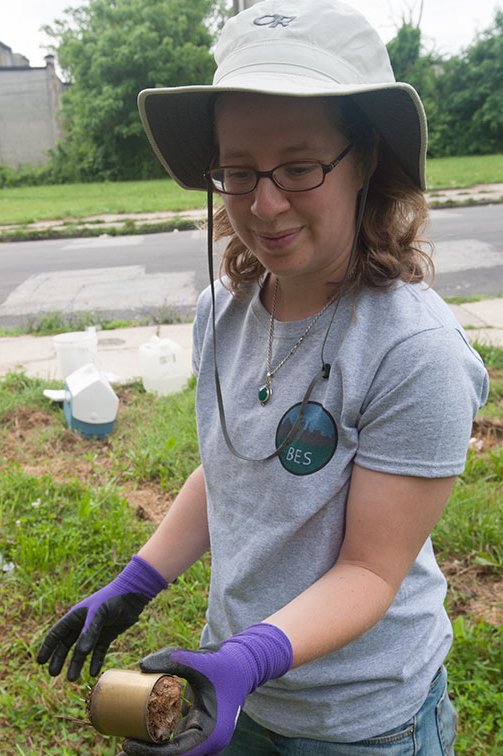Blog

Interview with BIA Fellow Anna Johnson
If there is one segment of society that is often misunderstood, it is people who work in science fields. Public perception of scientists tends to lean towards lab coats, crazy hair and beakers full of chemicals, especially in the eyes of children. In reality, most scientists are just regular people who want to make the world a better place through scientific discovery. The best way to dispel the myth that scientists are boring or crazy is to get to know them; the purpose of this segment is to talk with real scientists to ask them what they love about their jobs and why they think their work is fun and important.
For our next installment in this series, we sat down with BIA Fellow Anna Johnson. The Botany in Action Fellowship program at Phipps fosters the development of the next generation of plant-based scientists who are committed, first, to excellent research, and second, to educational outreach. The BIA program provides Fellows with funding for use towards field research in the US or abroad and a trip to Phipps, to engage in science outreach training and opportunities to share his or her research to public audiences. Anna has been a BIA Fellow for two years, researching urban ecology.
We interviewed Anna about her passion for the urban environment, why she loves planting flowers in vacant lots, and how practicing science can expand our world.
1. Introduce yourself and your work in 5 sentences or less.
I grew up in rural Pennsylvania but when I moved to Pittsburgh, PA after college, I fell in love with the city. Now, I split my time between my home in Pittsburgh and where I work on my graduate degree, in Baltimore, MD. I am an urban ecologist, which means I study ecosystems that contain a combination of things you would expect to find in any terrestrial ecosystem (water, soil, plants, insects) but also built infrastructure (things like buildings, roads or bridges). One of the things I think about in my own life is what the role of humans should be in our world, and I try to study that too as a scientist, by studying what types of plants make their home in cities and how humans influence where they grow.
2. Why did you become a scientist?
I have always loved the natural world but didn’t really think about being a scientist until I worked as an environmental educator for a summer during college. I quickly began to realize how much I didn’t know about the natural world, and in the process of educating myself to better teach lessons, I realized that I actually had an aptitude for science, and that asking and answering questions was what I loved to do best (and bonus points if those questions were about our natural ecosystems!).
3. What part do plants play in your research?
I like to think of plants as a “habitat template”—in terrestrial ecosystems (that is, on land), plants really form the basis of ecosystems, and they are a big part of how we define habitats (what makes the forest the forest? The trees!). I study the plants that grow in vacant lots because I want to learn what species are able to survive in these tough relatively “new” habitats, and also (eventually—I haven’t gotten there yet with my research!) I’d like to study how their diversity affects other organisms such as pollinators or herbivores and the quality of the soils in vacant lots.

4. What is the most exciting thing you have ever done at work?
This is such a hard question! I find so much of what I do exciting because I love doing and trying new things, and my research always involves something new. Probably the most exciting thing that I have done recently is to help plant 25 vacant lots in Baltimore with wildflower seeds in April of this year, and then return to them in July to discover that they were beautiful and covered in flowers! I really didn’t think our plantings would work, but they did! I watched a family walk by one of the vacant lots and show the flowers to their child, and that made me so happy—that there was something they enjoyed looking at in a vacant lot that used to be mostly just viewed as a problem in their neighborhood.
5. What skills do you use in your job?
I love my job because I get to do different things almost every day, so I have to use lots of different skills. For example, I get to use/hone my organizational skills all the time (usually early in the morning, on my way to a day of field work as I write lists in my head of what tools I need to bring into the field with me…), but also I get to use my imagination when I write research proposals for new projects, my leadership skills when I have to convince my field crew that we should work all day in the cold or the heat or the rain and also some physical strength when I’m carrying heavy fence poles or digging holes in dry, compact soil.
6. What is your favorite part of your job?
I love sharing my work with other people. Science can be lonely sometimes, so I jump at any opportunity to work in groups on projects or to start new collaborations with people who might have new ideas about ways to do/think about things.
7. If you weren’t a scientist, what job would you choose?
I would probably work in an environmental non-profit of some sort—I really like working with groups of people on projects and I hate being in an office all day or talking about things I can’t see. I’d want to be out planting gardens or pruning trees or showing people how to care for/restore natural landscapes. Also, at the end of the day I would want to feel like I had done something useful that made people happier and healthier.
8. Why is science education important?
Science is all about asking and answering questions. To learn to do science is to learn how to collect data and then decide what it tells you (and be able to defend why you think that!). Science education is important because doing science is one of the only ways we can learn about things we don’t already know—otherwise, our world is very small because we are not able to add new knowledge to it, only revisit the same ideas and thoughts over and over. Science teaches us to explore new possibilities and gives us hope for the future.
Anna is a great example of someone who uses her work to help others; scientists contribute important information to our collective body of knowledge all the time by asking good questions and seeking out the answers.
The above photos are used courtesy of Anna Johnson and Phipps Science Education.

